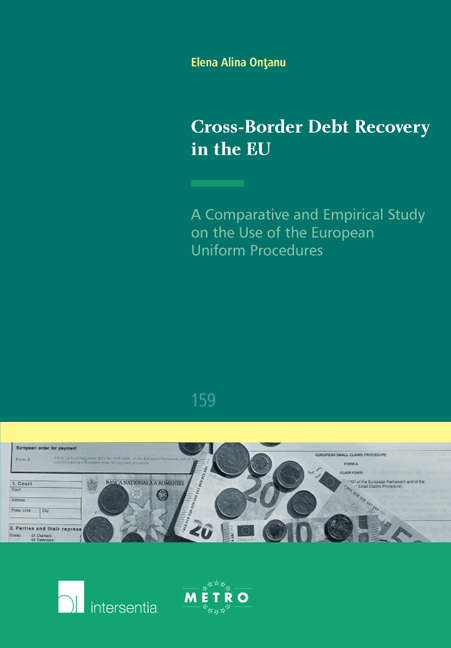 Cross-Border Debt Recovery in the EU
Cross-Border Debt Recovery in the EU Book contents
- Frontmatter
- Acknowledgements
- Contents
- Abbreviations
- Chapter 1 Introduction
- Chapter 2 A European Perspective on the EOP and the ESCP
- Chapter 3 England and Wales
- Chapter 4 France
- Chapter 5 Italy
- Chapter 6 Romania
- Chapter 7 Comparative Perspectives on the Functioning of the EOP and ESCP
- Chapter 8 Conclusions
- Samenvatting
- Annex
- Bibliography
- Table of Cases
- Curriculum Vitae
- Ius Commune Europaeum
Chapter 2 - A European Perspective on the EOP and the ESCP
Published online by Cambridge University Press: 11 October 2018
- Frontmatter
- Acknowledgements
- Contents
- Abbreviations
- Chapter 1 Introduction
- Chapter 2 A European Perspective on the EOP and the ESCP
- Chapter 3 England and Wales
- Chapter 4 France
- Chapter 5 Italy
- Chapter 6 Romania
- Chapter 7 Comparative Perspectives on the Functioning of the EOP and ESCP
- Chapter 8 Conclusions
- Samenvatting
- Annex
- Bibliography
- Table of Cases
- Curriculum Vitae
- Ius Commune Europaeum
Summary
Historical Background
The European Union has adopted a number of regulations in the area of civil justice with the aim of simplifying cross-border litigation, reducing its costs, and providing legislative tools that will facilitate access to justice for businesses and consumers. The regulatory and procedural diversity among the national systems can lead to an ‘enforcement deficit’ within the internal market. In cross-border litigation, the diversity of civil procedure rules may result in significantly lengthier proceedings, disproportionate costs of court actions, and cumbersome procedures. In addition, it may also require the employment of legal practitioners in more than one jurisdiction. The situation is even more challenging for creditors when cross-border cases face more procedural requirements, while purely domestic claims benefit from rapid recovery instruments. Consumers and small- and medium-sized businesses are particularly sensitive to these hurdles related to crossborder litigation. This can easily dissuade them from taking action, thus limiting their access to justice, especially for uncontested and small value claims.
The Conclusions of the Tampere European Council emphasised the need for improved access to justice, mutual recognition of judicial decisions, and greater convergence in civil law. For this purpose, the adoption of new procedural legislation for cross-border cases, including for uncontested and small value claims, was considered. The Council Draft Programme for Mutual Recognition underlined the priority of abolishing the exequatur for uncontested claims in order to promote the rapid recovery of outstanding payments and to simplify and speed up cross-border litigation in small claims, especially for consumers. The 2002 Green Paper argued that there is a need for EU procedures concerning these type of claims, pointing to the excessive costs, delays, and complexity of domestic procedures when the claims are not disputed as to their merits or are of small value. Further, as well as the available national solutions, the Paper investigated the possible features and procedural models that would be suitable for the new procedures. This formed the basis for the European Commission proposal for the adoption of two regulations in 2004 and 2005. The Regulations seek to address some of the bottlenecks in cross-border litigation (e.g. complexity, costs, lengthy proceedings, the need for legal representation in various systems, and enforcement) in order to create a level playing field in this area of law and to enhance effective enforcement.
- Type
- Chapter
- Information
- Cross-Border Debt Recovery in the EUA Comparative and Empirical Study on the Use of the European Uniform Procedures, pp. 21 - 56Publisher: IntersentiaPrint publication year: 2017


